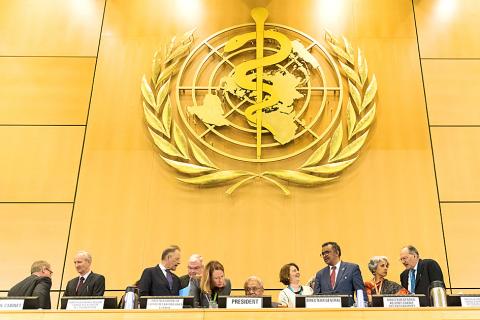The US, Japan and three other countries have added their support for Taiwan’s inclusion in the WHO at an ongoing meeting of the world body’s executive board in Geneva, Switzerland.
US Department of Health and Human Services Office of Global Affairs Deputy Director Colin McIff on Monday urged the WHO during the meeting to allow Taiwan to participate in relevant technical activities.
“As the WHO leads the global response to health emergency, including the ongoing outbreak of Ebola in the Democratic Republic of [the] Congo, it is critical that the organization be able to engage the technical expertise and financial resources from all interested parties,” McIff said.

Photo: AP
The US was pleased when Taiwan offered to contribute US$1 million to combat Ebola last year, but was disappointed that the WHO has not found a way to accept the contribution, McIff said.
The government last month suspended the donation it pledged in May last year, after the WHO convention secretariat was unable to credit Taiwan in a way that it would find acceptable due to “political factors.”
The “participation of Taiwan in relevant technical work of WHO is beneficial to all,” McIff said.
Supporting Taiwan in an indirect manner, Japanese Ministry of Health, Labor and Welfare Senior Coordinator for Global Health Hiroyuki Hori called on the WHO to refrain from leaving anyone behind.
“As the world has become more globalized and the threat of infectious diseases that may spread beyond borders has become increasing, we assume that we should not make a geographical blank by leaving a specific region behind,” Hori told the meeting.
Meanwhile, three of Taiwan’s diplomatic allies also advocated for Taiwan’s cause at the meeting, despite the nation’s decision not to push for a formal proposal advocating for its inclusion in the WHO at this year’s meeting.
Solomon Islands Ambassador to the UN Barrett Salato told members of the executive board that millions of people in Taiwan could be vulnerable in the event of an outbreak, which could pose threats to people from other nations.
“Taiwan is a willing partner... We urge the WHO to invite Taiwan to participate meaningfully in all WHO meetings and programs in order to share its technical expertise and experience in global health emergency and humanitarian efforts,” Salato said.
Guatemala’s representative thanked Taiwan for expanding its cooperation with his country on healthcare and medicine accessibility for pregnant women, while Nicaragua’s representative said that the absence of representation for Taiwan’s 23 million people in the WHO could cause a vulnerability in the global health network.
Their support followed similar gestures by Taiwan’s diplomatic allies Eswatini, Haiti and Paraguay at an executive board meeting on Saturday.
Taiwan was able to attend the annual World Health Assembly as an observer from 2009 to 2016, when cross-strait relations were more amicable, but it has not received an invitation for two consecutive years.

Conflict with Taiwan could leave China with “massive economic disruption, catastrophic military losses, significant social unrest, and devastating sanctions,” a US think tank said in a report released on Monday. The German Marshall Fund released a report titled If China Attacks Taiwan: The Consequences for China of “Minor Conflict” and “Major War” Scenarios. The report details the “massive” economic, military, social and international costs to China in the event of a minor conflict or major war with Taiwan, estimating that the Chinese People’s Liberation Army (PLA) could sustain losses of more than half of its active-duty ground forces, including 100,000 troops. Understanding Chinese

The Ministry of Foreign Affairs (MOFA) yesterday said it is closely monitoring developments in Venezuela, and would continue to cooperate with democratic allies and work together for regional and global security, stability, and prosperity. The remarks came after the US on Saturday launched a series of airstrikes in Venezuela and kidnapped Venezuelan President Nicolas Maduro, who was later flown to New York along with his wife. The pair face US charges related to drug trafficking and alleged cooperation with gangs designated as terrorist organizations. Maduro has denied the allegations. The ministry said that it is closely monitoring the political and economic situation

‘SLICING METHOD’: In the event of a blockade, the China Coast Guard would intercept Taiwanese ships while its navy would seek to deter foreign intervention China’s military drills around Taiwan this week signaled potential strategies to cut the nation off from energy supplies and foreign military assistance, a US think tank report said. The Chinese People’s Liberation Army (PLA) conducted what it called “Justice Mission 2025” exercises from Monday to Tuesday in five maritime zones and airspace around Taiwan, calling them a warning to “Taiwanese independence” forces. In a report released on Wednesday, the Institute for the Study of War said the exercises effectively simulated blocking shipping routes to major port cities, including Kaohsiung, Keelung and Hualien. Taiwan would be highly vulnerable under such a blockade, because it

UNRELENTING: China attempted cyberattacks on Taiwan’s critical infrastructure 2.63 million times per day last year, up from 1.23 million in 2023, the NSB said China’s cyberarmy has long engaged in cyberattacks against Taiwan’s critical infrastructure, employing diverse and evolving tactics, the National Security Bureau (NSB) said yesterday, adding that cyberattacks on critical energy infrastructure last year increased 10-fold compared with the previous year. The NSB yesterday released a report titled Analysis on China’s Cyber Threats to Taiwan’s Critical Infrastructure in 2025, outlining the number of cyberattacks, major tactics and hacker groups. Taiwan’s national intelligence community identified a large number of cybersecurity incidents last year, the bureau said in a statement. China’s cyberarmy last year launched an average of 2.63 million intrusion attempts per day targeting Taiwan’s critical